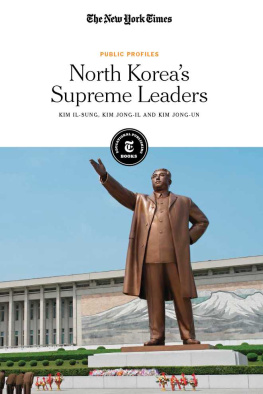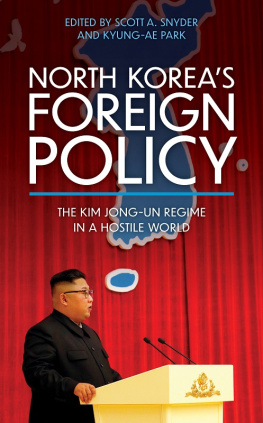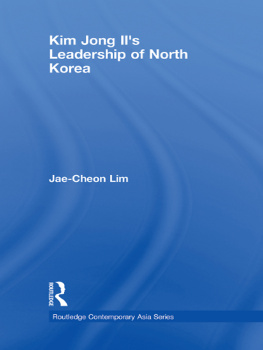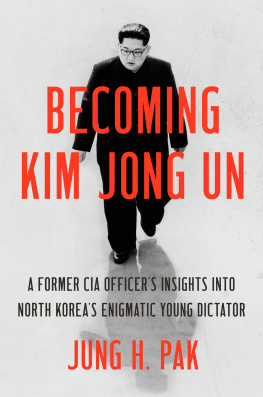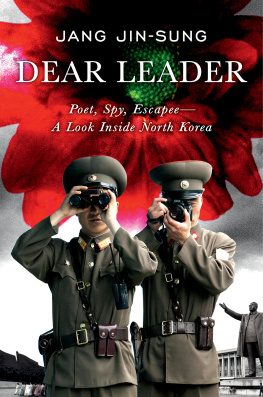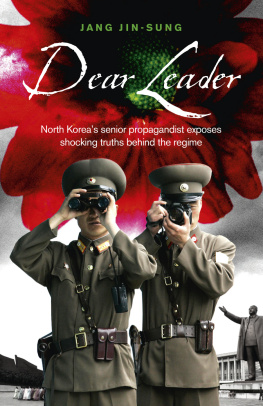Cover images from Wikipedia.
Published by State University of New York Press, Albany
2019 State University of New York
This book (previously entitled Path of Jang Sung-Taek ) was first pubished in Korea in 2016.
All rights reserved
Printed in the United States of America
No part of this book may be used or reproduced in any manner whatsoever without written permission. No part of this book may be stored in a retrieval system or transmitted in any form or by any means including electronic, electrostatic, magnetic tape, mechanical, photocopying, recording, or otherwise without the prior permission in writing of the publisher.
For information, contact State University of New York Press, Albany, NY
www.sunypress.edu
Library of Congress Cataloging-in-Publication Data
Names: Na, Chong-il.
Title: Inside North Koreas Theocracy : the rise and sudden fall of Jang Song-Thaek / Ra Jong-yil ; translated by Jinna Park.
Other titles: Chang Sng-taek i kil. English
Description: Albany : State University of New York Press, 2019. | Includes bibliographical references and index.
Identifiers: LCCN 2018021848 | ISBN 9781438473734 (hardcover : alk. paper) | ISBN 9781438473727 (pbk. : alk. paper) | ISBN 9781438473741 (ebook)
Subjects: LCSH: Chang, Sng-taek, 19462013. | Kim, Chng-il, 19422011. | Kim, Kyng-hi, 1946 | PoliticiansKorea (North)Biography. | Korea (North)Politics and government19942011. | Korea (North)Politics and government2011 | Political persecutionKorea (North)History21st century.
Classification: LCC DS935.7773.C438 N3313 2019 | DDC 951.9305/1092 [B] dc23
LC record available at https://lccn.loc.gov/2018021848
10 9 8 7 6 5 4 3 2 1
The art of biography is not unlike the creation of sculpture.
Out of a raw material of artifact and anecdote must emerge the semblance of living form.
James Panero
Preface
Back in late December 2011, inter-Korean relations were as icy as the fierce winter cold. In the northern half of the Korean peninsula, the Dear Leader, Kim Jong-il, who wielded absolute power for almost two decades, was finally dead. As a result, I was tied up for a considerable while answering countless phone calls from all corners of the globe. Many people even came to see me personally.
As a matter of fact, this was not the first time. Whenever an incident takes place in North Korea, several non-Koreans will, almost without exception, seek my view. Most are acquaintances of many years standing, and a good many visit me despite having to travel all the way to Korea to do so. Some actively contact me for professional reasons, while others call out of curiosity as they pass through.
That day was also one of those times. However, I was in the same position as the people who had come to see me, for I had no information of the real situation in North Korea. I did have a chance to discuss the inter-Korean situation with a handful of key personnel, though. Their main curiosity was the possibility of change in the North Korean system as a result of Kims death. The countrys new leader Kim Jong-un is a young man and his educational background is in Western Europe; therefore, many [North Korea watchers] had high expectations, and wondered aloud whether he might lead North Korea toward reform and opening, the same road chosen by other Socialist countries.
However, I was pessimistic about North Korea changing. Past cases of Socialist states adopting a broad range of reforms and opening their systems mostly required change at the very top. North Korea is different, with its unique hereditary power succession practiced over the last three generations. The North Koreans main objective is to guarantee the future of their system and to justify the continuity of the existing power structure. Therefore, it seems hard to imagine a fundamental change. I offered my honest view.
Dictators who seize power after overcoming all sorts of obstacles are well aware of the nature of that power: the minute it passes to someone else, the achievements of the dictator disintegrate overnight, like a sandcastle before the onrushing waves. The policies initiated, all the official achievements, fame, mythos are put at stake, to say nothing of the dictator and his families lives. This is not only the nightmare of all dictators; exaggerating only a little, it is the same for all holders of power.
One may have erected an impregnable fortress, but even so there is an ultimate limit. Dictators being mortal human beings, they cannot escape their physical limit: life. They ask themselves whether they have a trustworthy successor at hand, someone who will ably hold the power they built even after they are gone. The more unjustifiable the power, the more difficult the succession.
Of course, this leaves just one alternative. Even if it results in a long line of unjustifiable acts, one after another, the answer is to hand power down to ones own flesh and blood.
Another key point of interest that day was whether the new, young leader could peacefully and steadily build the foundations of his power and effectively rule the country. I forecast that he could, because there is no other alternative due to the characteristics of the North Korean system. It is often said that the new leader is young, but it is a historical fact that statesmanship cannot be evaluated on age alone. There are plenty of cases in history where leaders entrusted with somber duties have accomplished remarkable things despite being even younger than Kim Jong-un. One need look no further than his grandfather Kim Il-sung, who founded an entire state in a much harsher environment and maintained his power at an age only slightly older than that of the current leader.
Kim, the grandson, grew up in the center of state power from the moment of birth, and his father at least made an effort in his final years to build a succession system. Because of that, even though the young leader may have had to deal with some confusion in the early phase of assuming power, maintaining and guarding the power he inherited would not be overwhelmingly difficult. Then, my interlocutors and I exchanged views on the prospects for future inter-Korean relations, including the potential for improvement.
Jang Song-thaek came up toward the end of the conversation, almost as an afterthought. While discussing the various problems that could arise under the rule of a new leader, I asked aloud whether Jang wouldnt be the one who felt most threatened.
I wasnt basing my statement on any concrete circumstance or credible information. On the contrary, Jangs position seemed firm and secure as the guardian of the newly enthroned leader. Along with his wife, Kim Kyong-hui, Jang had recently received a military title and was appearing at official events dressed in uniform. He had not only become a member of the Party Central Military Commission, but the following year also became a member of the Politburo. In the year that followed, when he visited China at the head of a huge delegation as a special envoy, Jang was greeted by the Chinese government like a head of state. Many experts on North Korean politics commented that Jang had solidified his position as the number two in the new regime.
But this was the very point that made me feel uneasy. In the political world, there are constants. In any system of power, the number twos circumstances are subtly problematic. Particular difficulties arise when power is concentrated in one person, and the system is devoid of clear rules regarding power succession. Jang Song-thaek was a textbook example.


